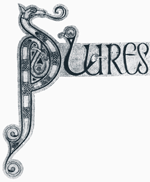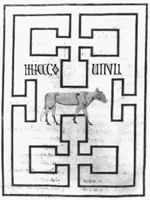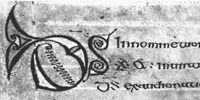
R.F. Foster, professor of Irish history at Hertford College, Oxford University, and author of W.B. Yeats: A Life (Oxford, 1997).
Foster believes that the best recent books on Ireland deal with social and intellectual history rather than politics: "David Fitzpatrick's Oceans of Consolation: Personal Accounts of Irish Migration to Australia (Cornell, 1994) is a tour de force of methodology and content. Reconstructing the emigrant experience with astonishing concreteness and eloquence, Fitzpatrick provides a history of the Irish mentality that does justice to a subject often left to sentimental generalization. Joep Leerssen's Remembrance and Imagination: Patterns in the Historical and Literary Representations of Ireland in the Nineteenth Century (Notre Dame, 1997) illuminates areas of cultural history too often obscured by jargon and parti-pris pieties. For politics, the key points of departure right now are Fintan O'Toole's two essay collections, Black Hole, Green Card: The Disappearance of Ireland (New Island, 1994) and The Ex-Isle of Erin: Images of a Global Ireland (New Island, 1997)."

M.L.R. Smith, professor of war studies at Kings College, University of London, and author of Fighting for Ireland?: The Military Strategy of the Irish Republican Movement (Routledge, 1997).
"Henry Patterson's The Politics of Illusion: A Political History of the IRA (Serif, 1997) evaluates the problems facing the nationalist movement as it tries to reconcile military absolutism with a desire to move Sinn Fein into the political mainstream. 'When the rhetoric is cleared away,' Patterson suggests, this accommodation is manifestly 'self-deluding and illusory' because the nationalists have never been able to stomach the compromises of politics. The book is important for understanding the cycle of revolt and retreat in Irish republican history. Many aspects of the Northern Ireland conflict are still under-studied. The IRA's foes in the loyalist paramilitaries continue to receive little academic attention. Steve Bruce's superb The Red Hand: Protestant Paramilitaries in Northern Ireland (Oxford, 1992) remains the outstanding work in this area."
Cheryl Herr, professor of English at the University of Iowa and author of Critical Regional and Cultural Studies: From Ireland to the American Midwest (Florida, 1997).
"At a time when debates among varieties of revisionism take center stage in Irish scholarly writing, two of the most forward-looking volumes to emerge recently are Border Crossings: Film in Ireland, Britain, and Europe (BFI, 1994), edited by John Hill, Martin McLoone, and Paul Hainsworth, and Big Picture, Small Screen: The Relations Between Film and Television (University of Luton Press, 1996), edited by Hill and McLoone. Based at the University of Ulster, the editors present the best of innovative media studies in Northern Ireland. With an often brilliant sociological depth, both books chart how Hollywood influences Irish film, which, in turn, influences local television and shapes regional identities. Rejecting the "paddyology" of Irish cinema studies, these books turn our attention to the complex economics of a rapidly evolving but still peripheral national industry."
Nancy J. Curtin, professor of British and Irish history at Fordham University and author of The United Irishmen: Popular Politics in Ulster and Dublin, 17911798 (Oxford, 1994).

"As a historian of gender in modern Ireland, I have found Lisa M. Bitel's extraordinary excavation of premodern women's lives, Land of Women: Tales of Sex and Gender From Early Ireland (Cornell, 1996), useful and fascinating. Was medieval Ireland actually the paradise of gender equity and fiercely independent warrior queens celebrated by nineteenth-century nationalists? Or was it a confining patriarchy with strong misogynist overtones? Male-authored medieval texts provide access to prevailing gender ideologies and at the same time reflect anxieties about how these ideologies were threatened by the productive reality of women's lives. The fact that women, in addition to bearing children and weaving cloth actually worked in the fields, for example, provoked a reinforcement of clerical and legal restrictions on the role of women in the conjugal economy. As Bitel shows in her beautifully written account, early Ireland witnessed a wide range and flexibility in gender relations."
Declan Kiberd, professor of Anglo-Irish literature at University College, Dublin, and author of Inventing Ireland (Harvard, 1997).
"Breandan Ó Buachalla's Aisling Ghéar (An Clóchomharm, 1997) is a beautiful study of vision-poems written after the defeat of Gaelic Ireland in the seventeenth century. In these poems, the speaker compares Ireland to a passive, mournful woman, who would only prosper again when her true king, a Stuart, crossed the sea with his Catholic forces to liberate her. Ó Buachalla shows how this literary convention is grounded in Irish history, going back to the Enlightenment skeptic and agnostic Wolfe Tone. The notion of an Irish identity rooted in a pro-monarchical Roman Catholicism poses bracing challenges for those of us who are trying to dismantle the connections between 'Catholic' and 'nationalist.' An English translation of this book will soon appear."
Vera Kreilkamp, professor of English at Pine Manor College and author of The Anglo-Irish Novel and the Big House (Syracuse, forthcoming).
"In Atlas of the Irish Rural Landscape (Toronto, 1997), editors F.H.A. Aalen, Kevin Whelan, and Matthew Stout have compiled a remarkable multidisciplinary survey of the landscape that shaped Irish folklore, literature, and visual art--focusing on the seven centuries of colonial rule. This intelligently illustrated atlas provides a social, archaeological, and geological history of the land and a polemic against Ireland's failure to protect its rural regions from, among other things, incursions by commercial culture. Termed an 'atlas with an attitude' by one Dublin reviewer, the volume deplores the loss of archaeological monuments, boglands, and vernacular architecture and argues for 'an informed stewardship' of the landscape by local communities. A related preoccupation with the local and vernacular, seen through an Anglo-Irish lens, appears in many of Hubert Butler's essays, which have posthumously become available in the United States in Independent Spirit (Farrar, Straus and Giroux, 1996)."
Elizabeth Cullingford, professor of English at the University of Texas at Austin and author of Gender and History in Yeats's Love Poetry (Syracuse, 1996).
"Luke Gibbons is one of Ireland's liveliest and most eclectic cultural critics. Transformations in Irish Culture (Notre Dame, 1996) brings together his essays on subjects as varied as eighteenth-century agrarian protest and contemporary Irish TV serials, postcards, and ad campaigns. This stimulating potpourri is unified by Gibbons's conviction that mass culture transforms the social realities it represents. Always finely attuned to the connections between genre and ideology, Gibbons demonstrates how the Irish TV series The Riordans, for instance, could explore controversial subjects like contraception, illegitimacy, and alcoholism because the open-ended serial format permitted the presentation of social dilemmas without requiring artificial dramatic closure. Numerous, similarly detailed readings of Irish culture support Gibbons's provocative thoughts about nationalism, ethnicity, and Ireland's complex relation to modernity."
Zack Bowen, professor of English at the University of Miami and author of Bloom's Old Sweet Song: A Collection of Essays on Joyce and Music (Florida, 1995).
"The best recent book on James Joyce and music--and a history of opera in Ireland as well--is Ruth Bauerle and Matthew Hodgart's Joyce's Grand Operoar (Illinois, 1997). Hodgart's more than three thousand citations of operatic allusions in Finnegans Wake establish Joyce's last book as a grand literary opera. But the contributions of Hodgart's co-author Bauerle make the book far more than an indispensable research tool. Bauerle provides the most complete history ever attempted of Joyce's relationship to opera, operatic performance, singers, and the general climate of opera reception in all the cities in which Joyce lived. She then convincingly relates that history to the structure and themes of the Wake, in which Joyce--himself an amateur singer and patron of singers--composed, staged, conducted, and sang his own peculiar version of opera."

Denis Donoghue, professor of English at New York University and author of The Old Moderns: Essays on Literature and Theory (Knopf, 1994).
"Scholars of Irish studies don't go quietly about their business, reporting findings, arguing cases, and leaving decisions to posterity. Since 1969, when people started killing one another again in Northern Ireland, writers have given up the pretense of neutrality. Every book is written as if it were a loaded gun. The best that can be said of the latest batch of studies is that they are worth fighting about. David Lloyd's Anomalous States: Irish Writing and the Postcolonial Moment (Duke, 1993) is a formidably intelligent book, but it has not been confronted as it deserves to be. I don't know why. Seamus Deane's Strange Country: Modernity and Nationhood in Irish Writing Since 1790 (Oxford, 1997) has not incited much dispute because it's just appeared, but there's time yet. Ireland is a strange country indeed."
--JOHN PALATTELLA
Are there any great books you think we missed? Let us know.